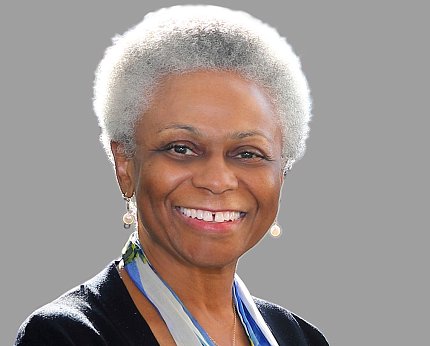2022 NIEHS Spirit Lecture Recognizes Bernard

“Great minds think differently,” said Dr. Marie Bernard, NIH chief officer for scientific workforce diversity, during her recent virtual NIEHS Spirit Lecture. “That is the catchphrase that motivates everything I do and that we do on my team.”
The Spirit Lecture began in 2002 as an annual event to recognize highly respected, outstanding women of notable achievement. Bernard received the honor this year. Part of the institute’s Diversity Speaker Series, the talk is held each year during Women’s History Month.
“Dr. Bernard embodies everything the NIEHS Spirit Lecture Award recognizes,” said NIEHS and National Toxicology Program director Dr. Rick Woychik. “I can’t think of a more highly deserving recipient.”
Bernard leads NIH efforts to recruit, cultivate and promote a diverse array of scientific talent, with the goal of advancing research innovation. She also co-leads the agency’s UNITE initiative, which aims to end structural racism in biomedical research.
She previously served as deputy director of the National Institute on Aging from 2008 to 2021. Her research focuses on nutrition and function in older adults, particularly minority populations, and she is a thought leader on the science behind scientific workforce diversity.
According to Bernard, several studies reveal the need for diverse scientific perspectives. For example, a 2015 paper revealed that articles published by researchers of the same ethnicity were more often associated with lower-impact journals and fewer citations.
“Diversity makes a difference,” Bernard said.
Lack of attention to diversity can constrain scientific advancement, she noted, citing research published in the Proceedings of the National Academy of Sciences.
Analyzing more than 5 million scholarly articles, authors found a link between greater diversity among researchers and greater production of new scientific knowledge.
Compared with men of the same races, Latina, Black and White women tended to have fewer publication credits in engineering, technology, mathematics and physics, but more in health, psychology and the arts. Asian men and women were roughly equal.
“The authors’ conclusion was that a different body of knowledge would be produced in the absence of these inequities,” said Bernard.
She said the results also reflect the reality of academic advancement.
“When you look at the professoriate, there’s a fair amount of diversity at the instructor level, but as you approach the department chair level, there’s much less,” she said.
So, what can be done to enhance diversity in biomedical research?
“Be transparent and accountable in hiring and promotion,” said Bernard.
“Make diversity metrics public by posting data on research funding,” she added.
“My office has taken the lead in enhancing recruitment and retention by creating a search protocol to identify candidates for scientific positions. We’ve provided curated lists of individuals for consideration and trained search specialists across NIH. We’re not virtue posturing.”
Bernard also emphasized the importance of support programs, such as childcare and virtual work opportunities.
“All the wonderful diversity statements in the world are not going to make for institutional change,” she said. “We are aligning our values with our award system, with new performance expectations for diversity, equity, inclusion and accessibility.”
UNITE is one example. It requires each NIH institute and center to develop a racial and ethnic equity plan.
“NIEHS is fully immersed in this and my hat is off to you,” said Bernard, who also wants to build on NIH’s Distinguished Scholars Program (DSP) that is open to tenure-track researchers who have demonstrated a strong commitment to promoting diversity and inclusion.
To that end, her office recently launched the 21st Century Scholars Program, which replicates principles of the DSP for extramural program staff.
